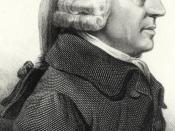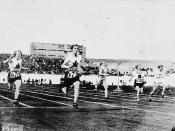Modern Economics.
Modern economics vs. political economy, as it used to be called-dates back to1776. It begins with the American Revolution. A man named Adam Smith, a Scottish philosopher, published a book called Smith's work is considered the first example of modern economics. In some places Smith is most famous for suggesting that business always try to monopolize markets and raise prices. Economists credit Adam Smith theory of the invisible hand - the idea that a market economy will operate so that no one can be made better off without making someone else worse off. It is as if an invisible hand is guiding the markets when in reality the markets merely reflect the activities of those trading in them.
Economics didn't actually start with Smith. Prices and economics were discussed long before Smith appeared. St. Augustine considered what a just price is. When prices for some widely consumed good or service surge or when some company s profits appear to reach stratospheric levels, the popular press seems to return to St.
Augustine and ask what is the just price. Others maintain that economics began much, much earlier. Economics figures in most national elections. In 1992 Bill Clinton s unofficial slogan was it s the Economy, Stupid In 1984 Ronald Reagan based his reelection on a simple question: Are you better off than you were four years ago Both approaches struck a responsive chord and both men were elected. Examples extend to almost every presidential campaign. John Kennedy was elected during the recession that plagued the prior administration; the recession ended in the second moth of Kennedy s term as he demonstrated a combination of timing and luck matched by few Presidents. Franklin D. Roosevelt s landslide victory in 1936-based on his efforts to turn back the Great Depression-...
![Gunboat Smith & Pelky [i.e., Pelkey] (LOC)](https://s.writework.com/uploads/5/58384/gunboat-smith-pelky-e-pelkey-loc-thumb.jpg)

